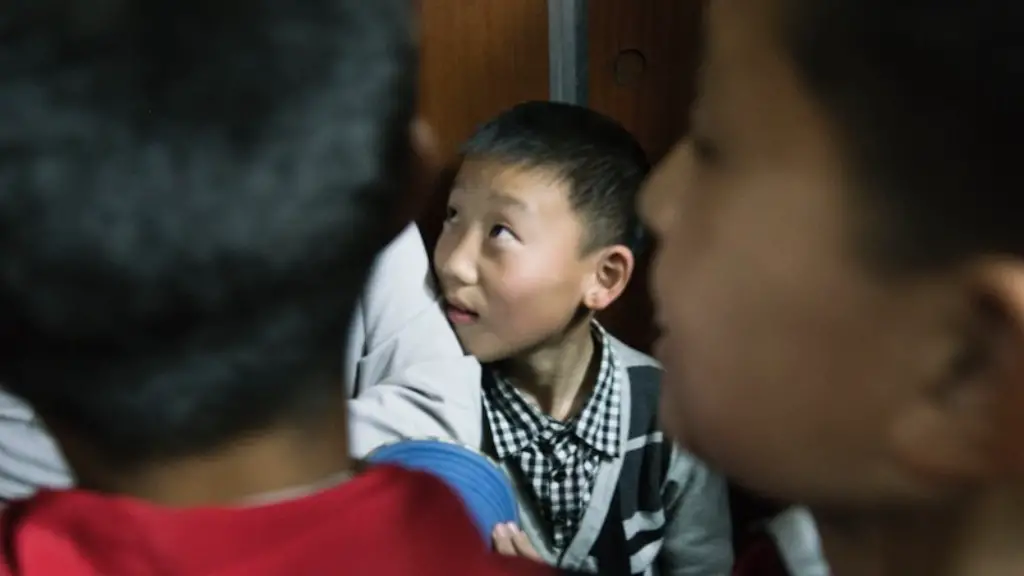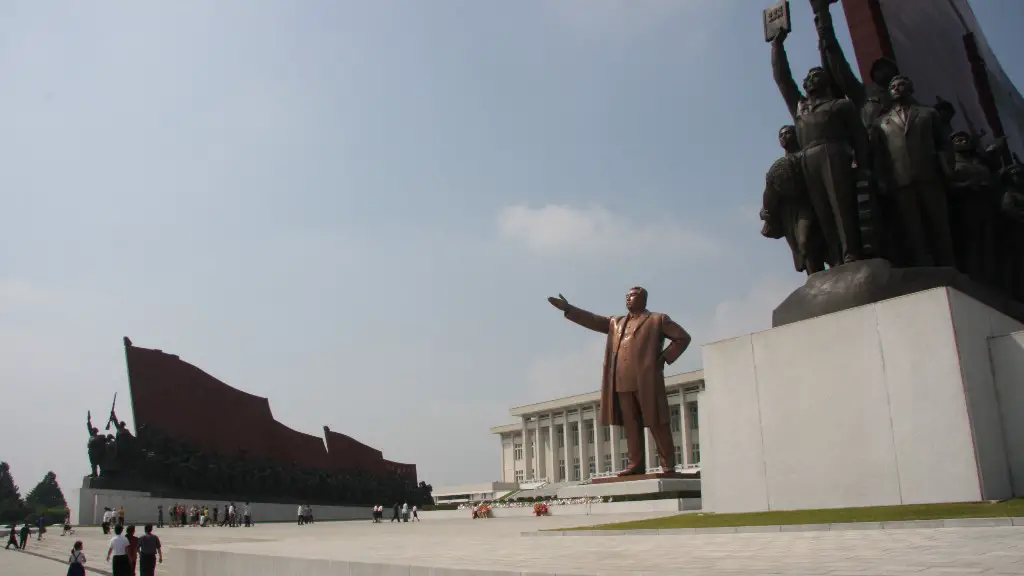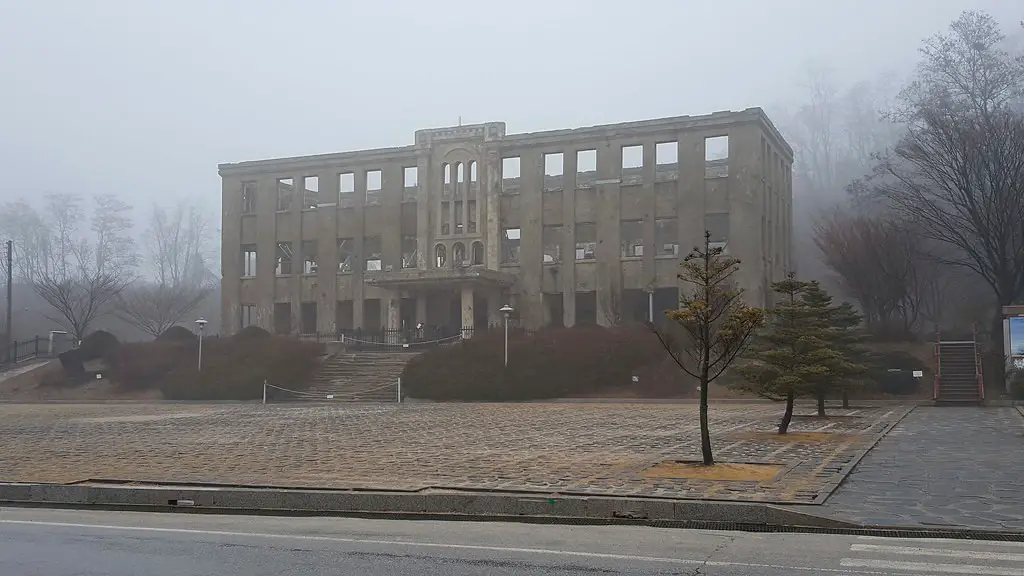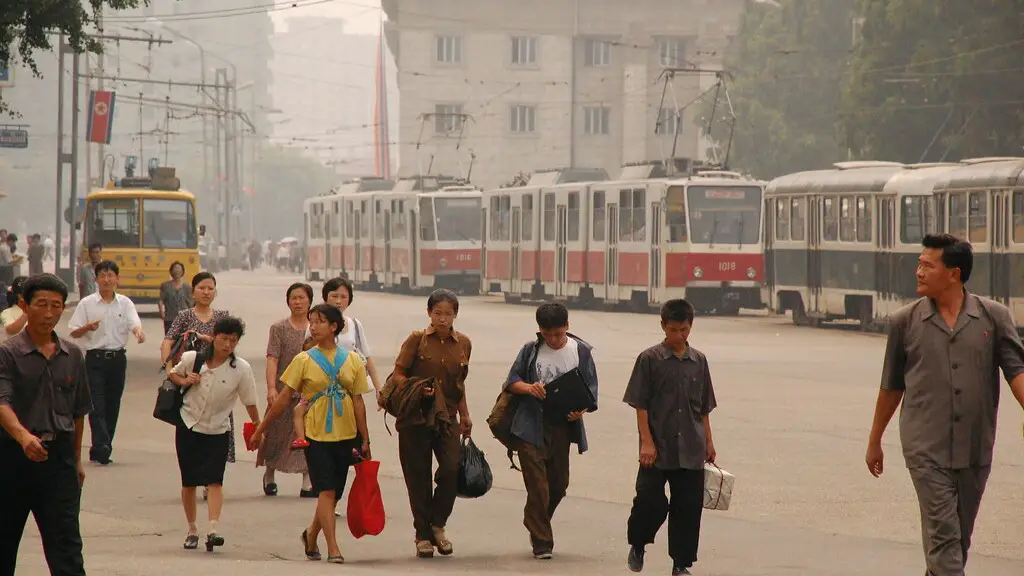Introduction
North Korea is one of the most isolated countries in the world. It is known for its extreme human rights violations, tight restrictions on its citizens, and a lack of freedom of movement. Since the 1940s, North Korea has been virtually closed off from the rest of the world and citizens are not allowed to leave the country, even for medical reasons. North Koreans are cut off from the global economy, access to modern technology, and the internet, making it nearly impossible to contact the outside world. Over the years, the North Korean government has become increasingly oppressive, and the world has taken notice.
Geographical Boundaries and Conflict
Finding a way out of North Korea is extremely difficult for citizens due to both physical and political boundaries. The Korean Demilitarized Zone (DMZ) is a strip of land located along the shared border between North and South Korea. The DMZ is 4 km wide and has been heavily guarded since the Korean War. This makes crossing the DMZ nearly impossible for North Koreans. Additionally, there are various international laws and agreements in place that restrict the movement of North Koreans.
The conflict between North and South Korea creates an additional barrier for citizens trying to escape the North. Both countries guard the border heavily, making it difficult for North Koreans to cross over into the South. Even if a North Korean is successful in crossing the border, they will likely face imprisonment, as South Korea classifies such crossings as fugitive arrest.
Restrictive Immigration Policies
The North Korean government heavily restricts its citizens from leaving the country. Traveling abroad requires a permit, which is only granted if both the family of the individual seeking to leave, and the government deem it necessary, such as for medical care. People who are able to obtain a permit due to family reasons, such as mourning the death of a relative, must return to North Korea within a certain time period. If they fail to meet this deadline, they will be accused of defecting and subjected to strict punishment.
The North Korean government also closely monitors and restricts its citizens from leaving the country via other ports of exit. It is very difficult for North Koreans to travel across the Chinese or Russian borders, or to take part in North Korean-run tours abroad. Additionally, the North Korean government has implemented a system of surveillance and informants to monitor citizens and discourage defections.
Human Rights Abuses
The restrictions and controls imposed by the North Korean regime have left the country’s citizens feeling trapped and unable to exercise their basic human rights. The lack of freedom of movement has caused human rights abuses such as indefinite detention without trial, torture, and disappearances. Citizens who are deemed “political” or “disloyal” to the regime are often subjected to inhumane punishments. The UN has also reported unfair trials and harsh sentences for those who have attempted to escape the country.
The North Korean regime has also used its citizens’ knowledge of the outside world as a means to control them. North Koreans are discouraged from speaking about the outside or having contact with foreigners, leading to a feeling of distrust when it comes to discussing the possibility of defecting. This creates an additional barrier for those seeking to escape the North.
Risk of Punishment
In North Korea, attempting to leave the country without permission is seen as a treasonable offense and leads to steep punishments. Those attempting to defect are often labeled as “anti-state criminals” and face the risk of detention, imprisonment, torture, and even execution. As the North Korean government cracks down on defections, citizens are increasingly deterred by the fear of being caught and punished for their actions.
Even those who are successful in crossing the border often face retribution at the hands of the North Korean government. North Korean authorities have been known to carry out extreme punishment against family members of defectors, including forced evictions, long-term detention, and even death.
International Pressure
In recent years, the international community has been increasing pressure on the North Korean regime to abide by international laws and to improve human rights. The UN, the European Union, and various NGOs have imposed economic sanctions and advocated for the protection of North Koreans’ rights. The international community has also taken steps to raise awareness about the lack of freedom of movement in the country.
However, tensions between North and South Korea continue to remain high, and there have been no signs that the North Korean government is willing to relax its restrictions on its citizens. As a result, North Koreans continue to be denied the right to freedom of movement, leaving them trapped in a highly oppressive and isolated environment.
Motivations Behind Strict Policies
The North Korean government is highly resistant to change, leading to its strict policies on citizens’ freedom of movement. The regime sees defections as a threat to their power, as those who flee the country are often vocal advocates for democracy and human rights. As a result, the government tightly regulates its citizens in order to safeguard its own power and discredit the people leaving the country.
Additionally, the North Korean government claims that it is protecting its citizens from the “evils” of the outside world and prevent them from being taken advantage of by foreign countries. However, these claims have been disputed by experts and human rights organizations as it is more likely that the regime is using these policies to maintain its grip on power.
Implications for Citizens
The restrictions placed on citizens’ freedom of movement by the North Korean government have created a highly oppressive environment for citizens living in the country. This system of control has left North Koreans feeling trapped, isolated, and unable to access the outside world. In addition, due to the risk of punishment, many North Koreans are discouraged from attempting to escape the country, leaving them with no escape from a highly oppressive and isolated environment.
Furthermore, the North Korean government’s human rights abuses have been well-documented, leading to an atmosphere of fear and distrust. Citizens are subject to indefinite detention and torture, leaving many feeling powerless and unable to exercise their basic human rights. In addition, North Koreans are regularly subjected to a system of surveillance, informants, and restrictions, making even the act of thinking about fleeing the country highly dangerous and unlikely.
Economic Impacts
The lack of freedom of movement in North Korea has had significant economic implications for the country. North Korea is cut off from the global economy, making it difficult for citizens to access various resources and opportunities. Additionally, the North Korean government has imposed various restrictions on the import and export of goods and services, further limiting citizens’ ability to access basic necessities.
In addition, the lack of movement has contributed to increasing levels of poverty in the country. With very little access to the outside world or to important resources, North Koreans are unable to take part in the global economy or benefit from foreign investment. As a result, levels of poverty and inequality in the country continue to remain high.
International Support
International organizations and NGOs have been working to support North Koreans in their quest for freedom of movement and access to the outside world. Various organizations have been advocating for the protection of North Koreans’ basic human rights and the lifting of travel restrictions. Additionally, they have been providing humanitarian aid and assistance to those who are able to successfully flee the country.
In addition, various governments have been offering financial and legal assistance to those who have successfully left North Korea. These countries have also been providing educational and employment opportunities for North Korean refugees in an effort to help them integrate into the new culture and make a better life for themselves.
Implications for the World
The situation in North Korea has implications for the entire world. The lack of basic human rights and freedoms, such as freedom of movement, is a major violation of international law and human rights. As such, various countries have been working together to impose sanctions on the North Korean regime in order to pressure the government to change its behavior.
Furthermore, the international community has been advocating for North Korean citizens and refugees in an effort to ensure that their rights are respected and that they are able to live in safety. The international community has also been providing humanitarian aid and assistance to help support North Korean refugees.
Citizen-led Efforts
A number of North Korean citizens have been using their own initiative to try and find a way out of the country. Many citizens have used their own resourcefulness and bravery to cross borders and flee the country, no matter the risk. In addition, North Koreans in the diaspora have been working to support those fleeing North Korea, through providing assistance and aid.
In addition, a number of North Koreans living in the country have been advocating for their right to freedom of movement and trying to find ways to make contact with the outside world. Through their courageous efforts, they hope to start a movement and shift the perspective of the North Korean regime.





